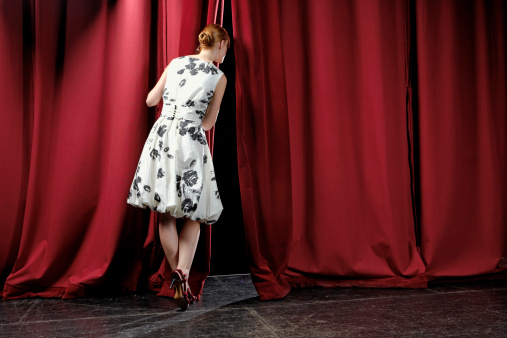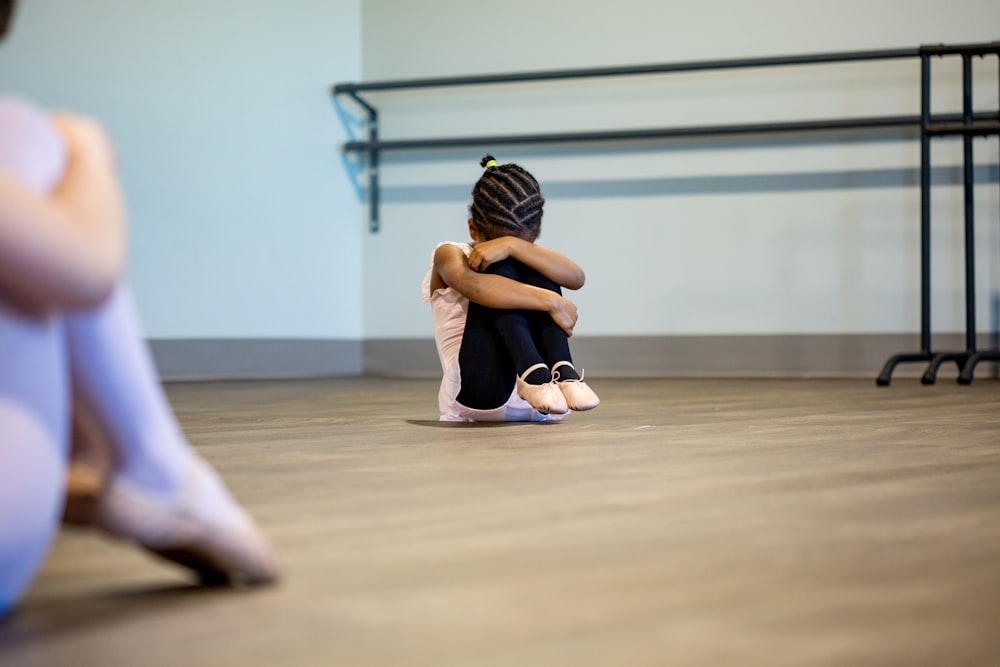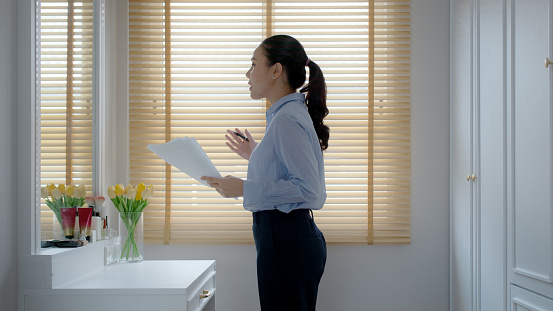
Performance anxiety is that persistent sense of dread that accompanies any opportunity to step in front of an audience and make a fool of yourself. But can performance anxiety be cured? There’s no fooling around this anxiety, either — it’s as real as it is universal. Some experts believe that performance anxiety is a symptom of an underlying anxiety disorder rather than a result of poor performance.
No matter how you categorize it, performance anxiety is no joke. Most of us feel it from time to time, but a small minority experience it chronically. The good news is that performance anxiety doesn’t last — it’s something you can learn to handle. Here’s everything you need to know about performance anxiety, its symptoms, causes, treatments, and more.
Contents
Can Performance Anxiety be Cured?
While there is currently no definitive cure for performance anxiety, it is feasible to substantially mitigate the fear and nervousness associated with meetings and performances. Seeking more intensive therapies like cognitive behavioral therapy can be highly effective in managing and overcoming performance anxiety. Additionally, some individuals with performance anxiety find relief through the use of beta-blockers such as propranolol, which can lower heart rate and block the effects of adrenaline.
Performance anxiety, though not curable, can be effectively managed through various strategies. Cognitive Behavioral Therapy (CBT) is a highly regarded approach that has shown substantial success in helping individuals overcome performance anxiety. CBT focuses on identifying and challenging negative thought patterns and beliefs that contribute to anxiety.
It equips individuals with practical tools to reframe their thinking, manage anxiety symptoms, and build confidence. By addressing the root causes of anxiety and providing coping mechanisms, CBT helps individuals gain greater control over their anxiety, allowing them to perform more effectively in high-pressure situations.
If you suffer from performance anxiety, therapy like CBT can be helpful. However, some individuals may require faster relief, in which case, beta-blockers such as propranolol can be a good option. These drugs are fast-acting and work by reducing the physical symptoms of anxiety, like a racing heart or trembling hands.
By blocking adrenaline, they can help manage the physical manifestations of anxiety, making it easier to perform with composure. It’s important to note that while beta-blockers can be effective, they do not address the underlying psychological factors causing anxiety.
Therefore, it’s essential to use them under the guidance of a healthcare professional. Combining therapy with medication can offer a comprehensive approach to managing performance anxiety, helping individuals achieve their personal and professional goals with greater confidence and ease.
What is performance anxiety?
Performance anxiety is the fear of being scrutinized and judged when performing in front of an audience. It’s that persistent sense of dread that accompanies any opportunity to step in front of an audience and make a fool of yourself.
Performance anxiety, also known as stage fright or social anxiety, is a psychological condition characterized by a persistent and intense fear of performing or presenting in front of an audience. It can affect individuals in various contexts, such as public speaking, acting, musical performances, academic presentations, or even everyday social situations.
People experiencing performance anxiety often feel heightened nervousness, self-doubt, and physical symptoms like a racing heart, sweating, trembling, and gastrointestinal discomfort when facing a performance or evaluative situation. This anxiety can significantly impact an individual’s ability to perform at their best and can hurt their overall well-being and confidence.
Performance anxiety can be caused by many different things, but it’s most often attributed to 3 factors:
- A lack of confidence
- Unrealistic expectations
- Inadequate preparation
There are many possible causes for performance anxiety, including a lack of confidence, unrealistic expectations, and inadequate preparation. These are just a few examples.
Related: What is Test Anxiety and how it Affects Students
How does performance anxiety develop?
Performance anxiety is born of a twofold fear: one, the fear of failing, and two, the fear of being embarrassed. As a result, it’s something that can derail you from taking action at all. Performance anxiety can develop for a variety of reasons, and it often arises from a combination of psychological, physiological, and environmental factors. Here are some common ways in which performance anxiety may develop:
- Early Experiences: Negative experiences or early failures in performance or social situations, especially during childhood or adolescence, can lead to the development of performance anxiety, which may create self-doubt and fear of repeating such failures.
- High Expectations: High personal or external expectations for success can put significant pressure on an individual, leading to anxiety when facing performance situations. Perfectionism and a fear of not meeting these expectations can be a contributing factor.
- Social or Cultural Factors: Societal and cultural pressures to perform well or fear of judgment from others can intensify performance anxiety. These external influences can lead to heightened self-consciousness and fear of scrutiny.
- Biological Factors: Genetic predisposition may play a role in the development of anxiety disorders, including performance anxiety. Individuals with a family history of anxiety disorders may be more susceptible.
- Trauma or Stressors: Past traumatic events or significant life stressors can trigger or exacerbate performance anxiety. These experiences may create a heightened state of alertness and fear in performance situations.
- Lack of Preparation or Skill: Insufficient preparation or perceived lack of skills for a particular performance can contribute to anxiety. The fear of failure in these cases is often rooted in a genuine concern about competence.
- Negative Self-Talk: Negative self-talk and distorted thinking patterns can foster self-doubt and anxiety. Individuals may catastrophize potential outcomes and engage in harmful self-criticism.
- Social Comparison: Constantly comparing oneself to others who appear more successful or competent can lead to feelings of inadequacy and anxiety when faced with a performance situation.
It’s natural for people to experience some level of performance anxiety before a big event (especially if it’s their first time), but in those cases, it usually goes away once you step on stage. If you find yourself feeling this way regularly — or if it never really goes away at all — you may need help with an underlying anxiety disorder.
Causes of performance anxiety
Performance anxiety is caused by being concerned with the way their peers or superiors are judging them, negative thoughts, fear of getting a negative evaluation or criticism, fear of being ridiculed, and how they are feeling judged. Performance anxiety can be triggered by a combination of psychological, social, and situational factors. Here’s a detailed explanation of some of the main causes:
- Fear of Failure: One of the primary causes of performance anxiety is the fear of failure. Individuals facing high-stakes situations often worry about not meeting their own or others’ expectations. This fear of falling short can create intense anxiety and pressure to perform perfectly.
- Unrealistic Expectations: Unrealistic or perfectionistic expectations, either self-imposed or externally placed, can set the stage for performance anxiety. The belief that one must achieve flawlessness can be paralyzing and lead to a fear of not measuring up.
- Lack of Confidence: A fundamental cause of performance anxiety is a lack of confidence in one’s abilities. When individuals doubt their competence or qualifications for a task, they can become consumed by self-doubt and anxiety.
- Concern About Judgment: Performance anxiety is often rooted in concerns about how peers, superiors, or an audience may perceive and judge the individual’s performance. The fear of negative evaluation or criticism can be overwhelming and create anxiety.
- Negative Thoughts: Negative thought patterns, such as catastrophizing potential outcomes, dwelling on past failures, or engaging in self-criticism, can contribute to performance anxiety. These thoughts can create a self-fulfilling prophecy of failure.
- Fear of Ridicule: The fear of being ridiculed or humiliated in a public or evaluative setting can be a significant cause of performance anxiety. The anticipation of embarrassment can lead to heightened anxiety and avoidance behaviors.
- Feeling Judged: Feeling constantly judged by others, whether in a personal or professional context, can fuel performance anxiety. The sense of being under constant scrutiny can exacerbate self-consciousness and anxiety.
- Social Comparison: Individuals often compare themselves to others who appear more successful or competent, which can lead to feelings of inadequacy and anxiety. The pressure to measure up to perceived standards can intensify anxiety.
- Past Trauma: Previous traumatic experiences, especially those related to performance or social situations, can trigger or exacerbate performance anxiety. These past traumas can create a heightened state of fear and hypervigilance in similar contexts.
- Environmental Factors: Environmental stressors, such as high-pressure work environments, academic expectations, or societal pressure to succeed, can contribute to performance anxiety. These external factors can amplify feelings of stress and anxiety.
The symptoms of performance anxiety

Performance anxiety can manifest a range of physical, emotional, and cognitive symptoms. Here are some common symptoms:
Physical Symptoms:
- Racing Pulse and Rapid Breathing: Increased heart rate and breathing rate are common physical manifestations of performance anxiety, as the body enters a heightened state of alertness.
- Dry Mouth and Tight Throat: A dry mouth and a feeling of a tight or constricted throat can make speaking or singing more difficult, often due to reduced saliva production caused by anxiety.
- Trembling Hands, Knees, Lips, and Voice: Fine motor skills can be significantly affected, leading to visible trembling or shakiness in the hands and other body parts, making tasks requiring precision challenging.
- Sweaty and Cold Hands: Anxiety can cause increased sweat production, resulting in clammy or cold, sweaty hands.
- Nausea and an Uneasy Feeling in Your Stomach: Gastrointestinal symptoms like nausea, stomach discomfort, and the sensation of “butterflies” or a “pit” in the stomach are common in performance anxiety.
- Vision Changes and Other Physical Symptoms: Some individuals may experience vision changes, such as tunnel vision or blurred vision, during moments of heightened anxiety. Additionally, other physical symptoms can include numbness or tingling sensations, muscle tension, and overall restlessness.
Emotional Symptoms:
- Fear and Apprehension: A pervasive and often irrational fear or sense of impending doom related to the performance or evaluative situation.
- Self-Doubt: A strong sense of self-doubt and a fear of inadequacy can lead to negative self-talk and low self-esteem.
- Irritability: Anxiety can sometimes result in irritability, making it challenging to interact with others in a calm and composed manner.
Cognitive Symptoms:
- Racing Thoughts: Intrusive and rapid thoughts about potential failure, judgment, or negative outcomes can dominate an individual’s thinking.
- Difficulty Concentrating: Anxiety can impair concentration and focus, making it challenging to remember information or perform tasks efficiently.
- Memory Problems: Some individuals may experience lapses in memory or difficulty recalling information due to anxiety.
- Negative Self-Talk: Individuals with performance anxiety may engage in negative self-talk, often discounting their abilities and anticipating failure.
It’s important to note that the intensity and combination of symptoms can vary among individuals experiencing performance anxiety. These symptoms can significantly impact an individual’s ability to perform well in high-pressure situations.

How to cure performance anxiety
Curing performance anxiety may not always be possible, but it can be effectively managed and reduced through various strategies. Here are some approaches to address and alleviate performance anxiety:
- Therapy: Consider seeking the help of a mental health professional, such as a psychologist or therapist, who specializes in anxiety disorders. Cognitive Behavioral Therapy (CBT) is particularly effective in addressing the root causes and symptoms of performance anxiety.
- Exposure Therapy: Gradual exposure to anxiety-provoking situations can help desensitize you to the fear associated with performance. Working with a therapist, you can gradually confront and conquer your fears, gaining confidence over time.
- Relaxation Techniques: Practices such as deep breathing, progressive muscle relaxation, and mindfulness meditation can help reduce the physical symptoms of anxiety, like a racing heart or trembling hands.
- Visualization: Visualization techniques involve mentally rehearsing a successful performance, which can boost confidence and reduce anxiety. Visualization can help train your mind to focus on positive outcomes.
- Positive Self-Talk: Challenge and reframe negative thoughts with positive self-talk. Replace self-doubt with affirmations and constructive thinking patterns that boost your self-esteem.
- Preparation: Adequate preparation and practice are key to building confidence. The more you practice and are well-prepared, the more confident you’ll feel in a performance or evaluative situation.
- Physical Fitness: Regular physical activity can help reduce overall anxiety and increase your ability to manage stress. Exercise releases endorphins, which can improve your mood and overall sense of well-being.
- Medication: In some cases, doctors may prescribe anti-anxiety medications or beta-blockers to manage the physical symptoms of anxiety. These should only be used under the guidance of a healthcare professional and are generally a short-term solution.
- Supportive Social Network: Talking to friends, family, or mentors about your anxiety can provide emotional support and help you feel less isolated in your experience. Sharing your feelings with others can be therapeutic.
- Mindfulness and Mind-Body Practices: Yoga, tai chi, and other mind-body practices can help you stay grounded and present in the moment, reducing anxiety. They promote relaxation and stress management.
- Performance Coaching: Consider working with a performance coach or specialist who can provide tailored guidance and techniques to enhance your performance and reduce anxiety.
- Self-Care: Prioritize self-care practices such as getting enough sleep, maintaining a balanced diet, and managing overall stress. A healthy lifestyle can contribute to improved mental resilience.
Remember that the effectiveness of these strategies can vary from person to person, and it may take time to find the right combination of approaches that work for you. In many cases, performance anxiety can be managed, allowing you to perform at your best with confidence and composure.
Using CBT for performance anxiety

One way to deal with performance anxiety is through cognitive behavioral therapy (CBT). CBT is a form of psychotherapy that helps people learn how to change negative thoughts and behaviors by identifying patterns in their thinking, understanding them, and changing them. CBT has been proven effective for people who have high levels of anxiety and stress.
Cognitive Behavioral Therapy (CBT) is a highly effective therapeutic approach for addressing performance anxiety. It focuses on identifying and challenging negative thought patterns and beliefs that contribute to anxiety and replacing them with more constructive, rational thinking.
In the context of performance anxiety, CBT helps individuals recognize and reframe self-doubt, catastrophic thinking, and irrational fears related to their performance. Through guided exercises and discussions with a trained therapist, individuals learn to develop a more balanced and realistic perspective on their abilities and potential outcomes, leading to increased self-confidence and reduced anxiety.
CBT also incorporates behavioral techniques, encouraging individuals to gradually confront their anxiety-provoking situations, known as exposure therapy. This exposure allows them to build tolerance and confidence, ultimately reducing the fear associated with performance. As a result, CBT equips individuals with practical tools and coping mechanisms to manage anxiety symptoms and perform more effectively in high-pressure situations.
Best Medications for performance anxiety
The choice of medication should be based on a thorough evaluation by a healthcare professional, considering factors such as the nature and severity of the anxiety, potential side effects, and any contraindications with other medications or medical conditions. Medications can be used to manage performance anxiety, but it’s essential to consult with a healthcare professional to determine the best approach for your specific situation. Here are some medications that are commonly considered for the management of performance anxiety:
- Beta-Blockers: Beta-blockers like propranolol are often prescribed for their ability to reduce the physical symptoms of anxiety, such as a racing heart, trembling, and sweating. They work by blocking the effects of adrenaline, helping to keep the body’s “fight or flight” response in check. Beta-blockers are typically taken before a performance or stressful event, and they can provide rapid relief from some of the physiological aspects of anxiety. They are commonly used by musicians, public speakers, and individuals facing high-pressure situations.
- Benzodiazepines: These medications, such as diazepam (Valium) or lorazepam (Ativan), have sedative effects and can help reduce anxiety symptoms. However, they are usually prescribed cautiously and for short-term use due to their potential for dependence and side effects like drowsiness and impaired cognitive function. Benzodiazepines are typically not recommended for long-term use or for individuals with a history of substance abuse.
- Selective Serotonin Reuptake Inhibitors (SSRIs): SSRIs like sertraline (Zoloft) and escitalopram (Lexapro) are antidepressant medications that can be considered for individuals with performance anxiety that is chronic and generalized. These medications can help address the underlying anxiety disorder, but they typically require several weeks to start taking effect.
- Serotonin-Norepinephrine Reuptake Inhibitors (SNRIs): Medications like venlafaxine (Effexor) are another class of antidepressants that may be used for performance anxiety. SNRIs work by affecting the levels of both serotonin and norepinephrine in the brain, which can help with anxiety symptoms.
Beta-blockers for anxiety are some of the best medications for stage fright. They work by interfering with the body’s release of adrenaline before and during stressful events, which reduces both physical and psychological symptoms of anxiety, like muscle tension, sweating, and racing heart rate. Some research suggests they have a significant effect in alleviating performance anxiety too — one study found that propranolol (a beta-blocker) reduced stage fright in musicians who took part in an audition by over 50 percent.
Does morning exercise help with anxiety?
If you’re experiencing anxiousness, the initial step you should take is to engage in physical activity. Exercise is a powerful tool that is often overlooked when it comes to alleviating anxiety. It can calm the mind and help you feel better. So, if you’re feeling anxious, engaging in physical activity might be the first thing you should do.
Morning or evening? Exercise can help reduce anxiety at any time of the day. The key is to find a time that works best for your body clock, which in turn will help reduce symptoms of insomnia and provide better mood and energy levels throughout the day.
Exercise not only helps to calm the mind, but it also releases endorphins, which are natural mood boosters that can enhance your self-esteem. Besides, if you’re not fond of gym workouts, there are plenty of other ways to incorporate movement into your daily routine. You could try something more fun like taking a dance class or playing soccer with friends on the weekend.
How do you relieve sexual performance anxiety?
The best way to address your male performance anxiety is to be open with your partner, get intimate in other ways, distract yourself, and get therapy.
If you are feeling performance anxiety and it’s affecting your relationship, the best thing to do is to talk about it with your partner. This can help both of you understand what needs to change for you to feel more in control. It also helps them understand how they can help you feel better about this. Your partner may be able to offer some insights that could make all the difference for your relationship.
If being intimate with your partner isn’t enough and you find yourself feeling anxious in other ways during sex, try exploring other types of intimacy that don’t involve intercourse or oral sex. Foreplay and cuddling are two great ways to relieve sexual tension without the pressure of intercourse. If you’re feeling anxious about sex because of past trauma, these forms of intimacy will allow you to work through those feelings without triggering a panic attack — which is a possibility when getting close during intercourse or oral sex.
Distractions can also be effective in dealing with performance anxiety. Whether it’s exercising (make sure it’s a healthy type that doesn’t make you more anxious) or just painting nails (or doing another simple task), distractions can help take the spotlight off of sex if the pressure of the situation is making things worse.
It’s important not only to relieve performance anxiety but also to deal with its root causes so that it doesn’t come back later. However, you can also get medications such as Erectin or VigRX.
Final words
Curing performance anxiety may not always be possible, but it can be effectively managed and reduced through various strategies. While there is currently no definitive cure for performance anxiety, it is feasible to substantially mitigate the fear and nervousness associated with meetings and performances.
Seeking more intensive therapies like cognitive behavioral therapy can be highly effective in managing and overcoming performance anxiety. Additionally, some individuals with performance anxiety find relief through the use of beta-blockers such as propranolol, which can lower heart rate and block the effects of adrenaline.
In many cases, performance anxiety can be managed, allowing you to perform at your best with confidence and composure. If anxiety significantly impairs your daily life and well-being, it’s essential to consult with a mental health professional for personalized guidance and support.
FAQs
How do I know if I have performance anxiety?
One of the signs of performance anxiety is when you feel a sense of dread about performing. You may also find that your stomach is in knots, your heart is racing, or you’re sweating profusely.
Can performance anxiety be cured?
Performance anxiety can be cured by addressing and treating the underlying cause of the disorder. In some cases, this means taking medication that regulates serotonin levels. Additionally, you can use hypnotherapy to address past trauma and work on changing your thought patterns.
How can I relax my brain from anxiety?
The first step to curing performance anxiety is practicing self-care. You need to take care of yourself and your body by getting enough sleep and eating a healthy diet. You can also use breathing exercises for relaxation, soak in a warm bath, or listen to soothing music. Practice mindful meditation or guided imagery, or find an escape like writing or having sex. There are so many ways you can relax your brain from anxiety.
Do all performers experience performance anxiety?
No, not all performers experience performance anxiety. Anxiety can be a symptom of an underlying anxiety disorder rather than a result of poor performance.
